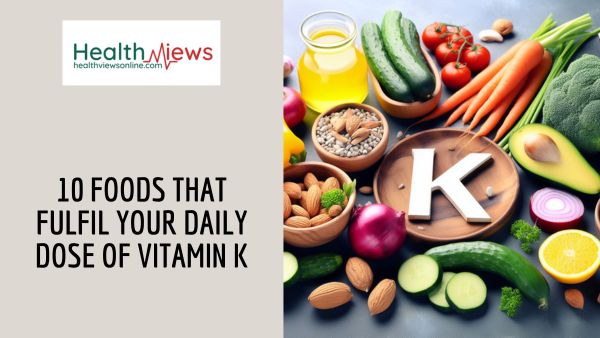Vitamin K is a crucial component that helps in blood clotting as well as bone and heart function. While vitamin K insufficiency is uncommon, inadequate intake can hurt your health over time. Inadequate intake can cause clotting of the blood problems, bone weakness, and an increased risk of heart disease.
As a result, you should ensure that you get adequate amounts of this vitamin from your food. The amount of vitamin K that should be consumed is determined by age and sex. Adult males and women should consume 120 mcg and 90 mcg, respectively.
Also, Read All about Calcium: Functions, Daily Dose, Deficiency, Sources & Toxicity
Here are some foods that are particularly high in vitamin K and fulfill your daily dose of Vitamin K
1. Kale
A cup of uncooked kale contains 113 micrograms of vitamin K, which accounts for 94% of the daily value. Kale is a dark leafy green that has been labeled a superfood since it is one of the most nutrient-dense foods per calorie. Its low calorie, fat, and carbohydrate content makes it a preferred source of vitamins and minerals for a variety of diets. Source
2. Swiss chard
When it comes to vitamin K, these bitter greens appear to have an advantage. Half a cup of cooked Swiss chard contains 150 micrograms (more than 125% of the DV). Source
Also, Watch health views web stories: 8 Foods That Fulfill Your Vitamin E Dose
3. Spinach
If you prefer a softer, less bitter flavor, a cup of uncooked spinach contains 145 micrograms of vitamin K (121% of the DV). This is significantly more than the amount advised for adult men and women, making spinach one of the most effective sources of dietary vitamin K. Source
4. Broccoli
Broccoli is a nutritious vegetable with numerous health advantages. Only half a cup of cooked broccoli has 110 micrograms of vitamin K or 92% of the daily value. It is a well-liked source of nutrients for people following a low-calorie diet intended to promote healthy weight loss because it is low in calories. Source
5. Brussels sprouts
Half a cup of Brussels sprouts has 78 micrograms of vitamin K, which is 65% of the DV. They include a tonne of antioxidants, anti-inflammatory, and heart-healthy substances. Source
6. Cabbage
Vitamin K is present in cabbage when it is cooked and amounts to 82 mcg (68% of the DV). It contains less calories, carbs, and fat. Additionally, it has a low glycemic index and is appropriate for a low-FODMAP diet. Source
7. Kiwi
Kiwi is one of the fruits with the highest levels of vitamin K. One raw kiwi fruit contains 28 mcg (23% of the DV) vitamin K. Kiwi, like other fruits, is high in vitamins and minerals. It is high in vitamin C, vitamin K, vitamin E, potassium, folate, and other nutrients. Kiwis are also linked to lower inflammation. Source
Also, Read All about Volumetric Diet: A Detailed Guide on Volumetric Diet for Beginners!
8. Collard Greens
A half cup of cooked collard greens contains 386 mcg of vitamin K (322% of the DV). Collards, like other leafy greens, are an excellent source of vitamin K. Fortunately, collard greens are a tasty way to get more of this important nutrient. Source
9. Green snap beans
Green snap beans have 60 mcg of vitamin K per cup cooked. Green beans are inexpensive, easy to find, and high in nutrients. Most grocery stores sell them fresh, frozen, or tinned. Source
10. Turnip Greens
531 mcg of vitamin K are present in one cup of cooked turnip greens. When eaten fresh, turnip greens have a bitter flavor, but once cooked, the flavor becomes milder. It’s worthwhile to experiment with turnip green recipes because this leafy green vegetable provides more than double the daily necessary amount of vitamin K. Source
It is advised to eat foods high in vitamin K since it has positive effects on bone density, heart health, and other body functions. Combine vitamin K sources with healthy fats for the best absorption.
Also, watch health web stories: 7 Ways How Mental Health Affects Physical Health





